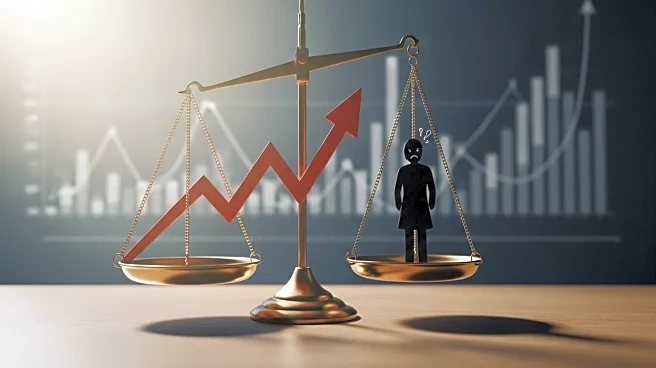What is the story about?
What's Happening?
The Federal Reserve Bank of Cleveland has reported that tariffs imposed by the Trump administration are now contributing to rising consumer prices across the United States. The Consumer Price Index (CPI) for August showed a 2.9% increase from the previous year, marking the fastest rate of inflation since January. This rise is attributed to the tariffs on heavily imported goods, which have led companies like Home Depot, Macy's, and Nikon to raise prices. The Federal Reserve's 'Beige Book' survey indicates that many businesses are now passing on the costs of tariffs to consumers, having previously absorbed these costs or stockpiled goods to delay price hikes. Key items affected include coffee, audio equipment, and household furniture, with coffee prices alone increasing by 21% due to tariffs on imports from Brazil.
Why It's Important?
The tariff-induced price increases are significant as they affect a wide range of consumer goods, impacting everyday expenses for American households. This development is particularly challenging for lower-income families, as wages are not increasing at the same rate as prices. The situation is expected to lead to more cautious consumer spending, potentially slowing economic growth. The tariffs, initially intended to protect domestic industries, are now contributing to inflationary pressures, which could have broader economic implications. As consumers adjust their spending habits, businesses may face reduced demand, affecting their profitability and potentially leading to further economic adjustments.
What's Next?
Economists predict that the impact of tariffs on inflation will continue throughout the year, with consumers likely to bear a significant portion of the costs. This could lead to increased financial strain on households, prompting further changes in spending behavior. Businesses may need to explore new strategies to manage costs and maintain consumer demand. Additionally, ongoing trade negotiations and potential policy adjustments could influence the future trajectory of tariffs and their economic impact.
Beyond the Headlines
The tariff situation raises questions about the long-term sustainability of current trade policies and their alignment with broader economic goals. The reliance on tariffs as a tool for economic leverage may need reevaluation, considering their unintended consequences on domestic inflation and consumer welfare. The situation also highlights the interconnectedness of global supply chains and the challenges of balancing protectionist policies with economic stability.















